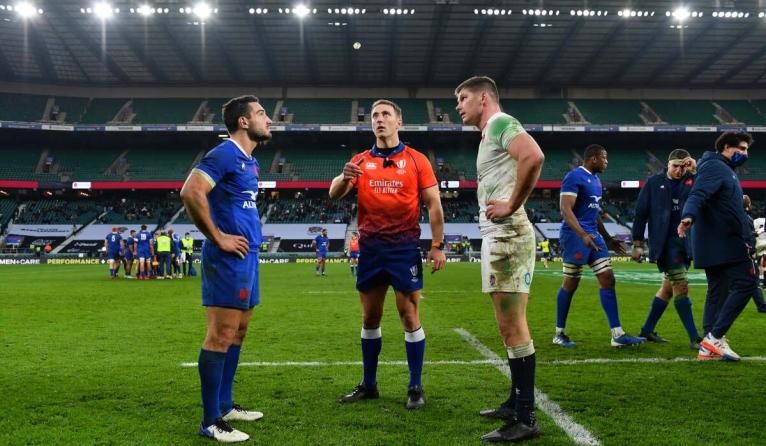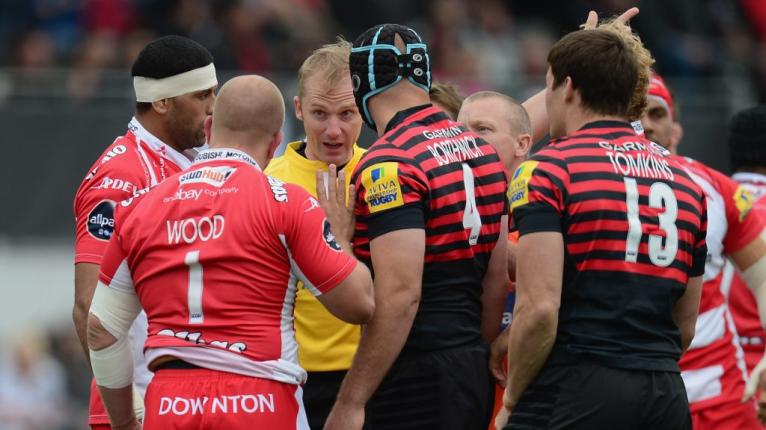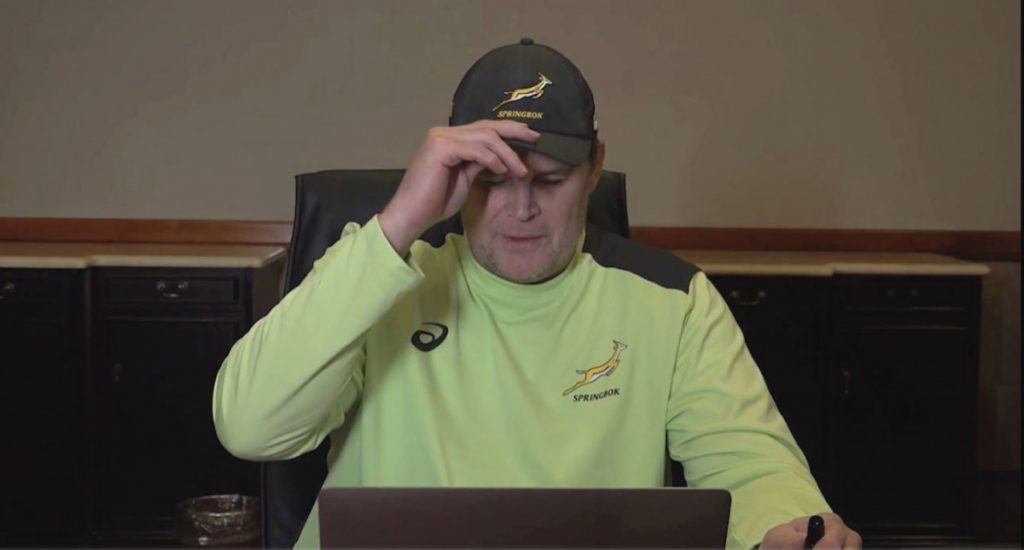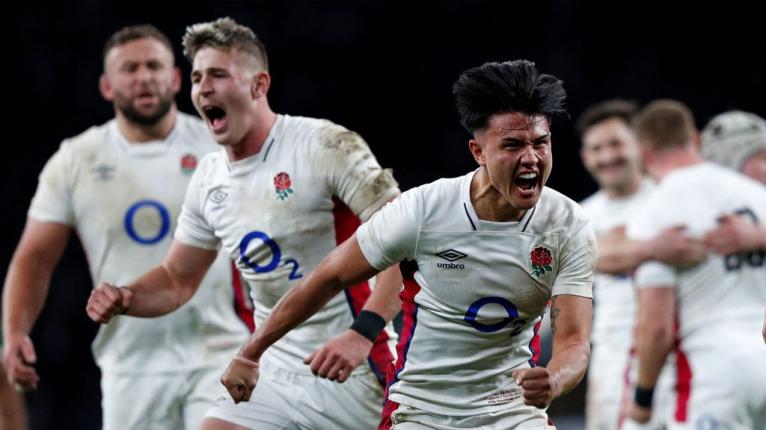Modern rugby players are used to being bundled around in the industrial tumble dryer of continuous feedback. Buffeted by adoring comments one week; scalded by stinging criticism the next. It’s an intrinsic part of the experience. Old-fashioned player ratings look increasingly anachronistic in the era of social media. But as depressing and soul-destroying as it can be, it’s at least balanced by the hero worship they receive from other quarters.
There is no such affirmation for professional referees. The criticism is constant and unrelenting; the compliments rarer than a Welsh victory over the All Blacks. Yes, Nigel Owens received plaudits for his comedic asides and Wayne Barnes for his clear, unfussy style, but these are the exception rather than the rule. As Andrew Brace, the international and URC referee, ruminates on his chosen profession, he reflects that a job well done is most often greeted with silence.
“One of the best bits of advice I ever received,” he says, “was that if you’re not being talked about afterwards, you’ve had a good game.” So while the gamut of emotions for a player runs from the depths of despair to the lofty heights of elation, for a referee it runs from the same depths of despair to… nothing.
Brace knows more than most how wounding the slings and arrows of public opprobrium can be. In the wake of the contentious Autumn Nations Cup final between England and France last year, he received death threats and abuse on an industrial scale. Much of this was spat angrily on to his Twitter timeline beneath an obituary for his father, who had died suddenly that year at the age of 65. There is little humanity to be found in the darkest recesses of social media.
As well as the death threats, I had people telling me never to come back to France again. I had more than a thousand messages on Instagram and someone made a parody profile of me on Twitter just to abuse me.
Andrew Brace
Reflecting 12 months on, Brace is philosophical: “I don’t mind taking criticism if you don’t perform – and the reality is we weren’t good enough that day as a team – but when it goes over the line and becomes abuse, that’s a problem. My sister was getting messages because they found her through my profile. It’s a sad, sad world that we’re living in when people go to such lengths to threaten your family. As well as the death threats, I had people telling me never to come back to France again. I had more than a thousand messages on Instagram and someone made a parody profile of me on Twitter just to abuse me.
“It opened my eyes to the ugly side of social media – people can put anything out there and there are no repercussions. People just don’t think, do they? It’s like the Euros final when Marcus Rashford and the lads missed their penalties. The abuse they suffered was horrendous. Until Twitter and Facebook put stronger rules in place, nothing will change. (These people) should at least have to register with an ID so they can be held to account,” says Brace.
The source of the trolls’ anger was a missed knock-on in the build-up to an England try that decided the outcome in their favour. There was also a surreal conspiracy theory doing the rounds that one of the refereeing team had deliberately coughed or burped while Owen Farrell was taking his kicks at goal. While Brace acknowledges that some of the big calls were wrong, he feels the level of vitriol was wholly disproportionate.
“The first tweet they’d have seen was about my Dad’s obituary. My Dad went on a road trip where he’d traced his father’s footsteps from World War II. That was my pinned tweet at the top of my page and they jumped on it saying I was a shit referee, that I’d ruined the game,” says Brace. “Some of them were asking how much I’d been paid to get England over the line. One of the messages my sister got said none of my family should ever come to France again, another said they hoped I’d die of Covid. ‘I hope your family die of Covid, you piece of shit’.” It’s a depressingly familiar tale in the age of instant, unfettered access. Social media may have fostered closer links between players and fans, but it has also provided a fertile breeding ground for rage and abuse.

The ramifications didn’t end there. In a cruel twist of fate, Brace was scheduled to referee Toulouse against Exeter in the Champions Cup the following week. A massive tie between two of the competition’s heavyweights. Joel Jutge, the man in charge of EPCR’s referees at the time, made the understandable call to remove him from the firing line. With the emotional temperature in France still bubbling in the red, it was a common-sense decision made with Brace’s welfare at heart but it wasn’t interpreted that way.
“The perception was that I’d been dropped,” he remembers. “The reality was Joel rang me and said, ‘There’s no point putting you in France after everything that happened last week, so we’re going to move you to Bristol v Clermont’. The media then jumped on the bandwagon, putting out these false headlines along the lines of, ‘Referee dropped after Autumn Nations Cup final’. That obviously wasn’t the case but I guess people’s attentions spans are shrinking so much they often don’t click beyond the headline and read the full story.
“I really struggled after that England v France game. It hit me hard. You think you’re strong enough to deal with anything; that you’ll come back stronger after a bad performance but it really got me down. I was so anxious leading into that Bristol-Clermont game. I was thinking, ‘If this goes tits up again from a French perspective, my career is on the line’. Thankfully it was a really open game between two highly skilled teams who like to throw the ball around.”
The week after, Brace was back on French soil in charge of Montpellier v Wasps. Six minutes in, Montpellier full-back Henry Immelman clattered recklessly into Wasps scrum-half Will Porter, striking him on the jaw with his shoulder. “I thought, ‘Typical. Six minutes in, and I’ve got to give a red card to a French player’. You couldn’t write the script,” says Brace. “I was pretty sure that it was a red and I was supported in that, but 10-15 minutes later – I’ll never forget it – I started going dizzy and thought I was going to collapse on the pitch. I had a really, really bad migraine from all the stress I was under and thought I was going to have to come off. It really affected me for a good month or two.”
Wasps won comfortably and while the red card was entirely justified, Brace again found himself the subject of some misleading headlines: “It was all, ‘Autumn Nations Cup final referee in the news again after sending-off’.” This time, social media proved a force for good with several high-profile players and pundits leaping to Brace’s defence. “Everyone jumped on the bandwagon for me in a positive way,” he says, “saying what a dreadful headline it was, that it had been the correct decision to send him off and that the newspapers were putting me back in the spotlight to be abused again. Simon Zebo put it out there, saying that the nasty cowards needed to be held to account.”
There is so much ambiguity in the laws and everyone has an opinion on things. You’ll meet with some of the top referees in world rugby and put a clip up on the screen, and half the time we’ll have 50/50 splits on certain decisions.
Andrew Brace
All of this begs the obvious question: why would anyone want to be a rugby referee? Having to navigate the often labyrinthine law book while 30 players are clattering into one another at speed is a nigh-on impossible task. It’s an oft-quoted observation that there are at least 10 offences at any given breakdown. Rugby refereeing is about knowing when not to blow, as much as when to blow. “Our game is not black and white,” says Brace. “There is so much ambiguity in the laws and everyone has an opinion on things. You’ll meet with some of the top referees in world rugby and put a clip up on the screen, and half the time we’ll have 50/50 splits on certain decisions.”
There often isn’t a definitive right or wrong answer and the key to good refereeing, Brace says, is the degree to which you can “sell” the decision. “The top refs in the world are the ones who communicate the best; those who can explain things in a way that Joe Soap watching at home can understand. Bringing people with you is half the battle. I hate saying it, but that’s the way the game’s gone. You have to sell your decision to the watching world,” he says.
The absence of the absolute means decisions are almost always open to interpretation. And with rugby being a global game, there are inevitably different interpretations across different territories. “The URC (United Rugby Championship) gets so much criticism, but coming from five different Unions, you have five different groups of referees who are all being coached differently,” says Brace.

“But if you had everybody the same, you might as well put robots out there, and that’s not what we want. We want real refs with a feel for the game who know what not to blow as opposed to blowing everything. In the Premiership and Top 14, they have one referees’ manager and everyone is coming from the same directive. It hasn’t helped this season not having that manager or head of referees in the URC.”
A few weeks after the Wasps-Montpellier game, Brace was invited to take charge of England versus France in the Six Nations. A repeat of the Autumn Nations Cup final. South African Jaco Peyper had been originally nominated to officiate but was subject to Covid-related travel restrictions. “All the doubters were saying, ‘You can’t put Andy Brace into that game’ but when Joel (Jutge) rang me up to ask how I’d feel about doing it, I said, ‘Bring it on’. There’s no better way to answer your critics. To have said no would have made me look weak. I knew what was coming next with the media but Joel announced it with plenty of time to spare so that hopefully the hype would have died down by the time the game came around.”
In the week prior, Brace came off social media and focused 100% on the game. “I met with my psychologist, Tadgh McIntyre, and he spoke about controlling my own process and allowing my muscle memory to take over. He told me, ‘You’re in that place because they believe in you, and you have to just be in the moment’,” he says.
Brace relates a story about watching the Cricket World Cup final, and hearing Mike Atherton explain how Ben Stokes is an instinctive player who operates at his best when he plays “in the moment” but, in order to be instinctive, he has to train to a really high level so that when he needs to surrender to his instincts, the muscle memory takes over. “In the moment” is now the place Brace always strives to be. That means resisting the urge to revisit earlier decisions while the game’s unfolding. He has taught himself to bury those in-game doubts and deal with them when the review comes around. He still suffers nerves before big games, but he describes these as “good nerves”.
“I refereed my second European final this year – Montpellier v Leicester in the Challenge Cup. Franky Murphy and Chris Busby were with me, and I remember saying to Frank before the game, ‘I’m not going to be able to do this’. I was feeling really sick. I was in the toilet, thinking I wasn’t good enough and trying to banish all those negative thoughts, but it all worked out fine,” says Brace.

The recent Rassie Erasmus saga has drawn attention to the degree of pressure faced by international referees. It’s one thing dealing with a partisan, ill-informed mob on social media, but the World Cup-winning coach posting an hour-long video eviscerating the performance of Nic Berry during the first Lions Test in the summer was a different matter entirely. “That broke all boundaries,” says Brace. “Poor Nic. What effect is that going to have on him in terms of not being allowed to ref in South Africa for the foreseeable? The video was bad enough, but it’s everything that came after that; the pressure that he and his family were put under. He had to stay out there for the following two Tests and, not only that, he had to go back to Australia and quarantine for two weeks before he could go home. All of that with that cloud hanging over him meant he was in a pretty dark place.”
The Rassie video gave all armchair rugby fans a genuine insight into the kind of intense scrutiny all referees come under during the course of just doing their job. These lengthy, detailed videos unpicking every aspect of the referee’s performance are a common and essential part of the review process. They’re just not normally leaked into the public domain giving everyone else a chance to pore over them. Can you imagine another occupation where everything you do is placed under a microscope and picked apart with such forensic, unrelenting attention to detail? It would be exhausting.
A lot of coaches have asked the question, ‘Can we all do this now?’ and if World Rugby don’t come down hard on it, then it becomes a free-for-all and we’d travel down a road of no return.
Andrew Brace
“That Rassie one was pretty long,” says Brace with a smile, “but’s it’s not far off what we’d normally get sent privately. South Africa as a team, particularly with Felix Jones coming on board, do very, very detailed reviews, and a lot of their stuff is valid for us in terms of learning. It’s not just about them chancing their arm; a lot of the stuff is so detailed it can really help us moving forward.”
So what does Brace think about the impact of Rassie-gate?
“You can say it was really smart because they ended up winning the series,” he says, “but the integrity of the game has been damaged because of it. Hammer me behind closed doors if I wasn’t good enough but as soon as you put that video in the public domain, a lot of Rassie supporters will jump on the bandwagon and you’re going to get a hell of a lot more criticism coming your way. If you allow that, it’s open season. A lot of coaches have asked the question, ‘Can we all do this now?’ and if World Rugby don’t come down hard on it, then it becomes a free-for-all and we’d travel down a road of no return.”
As fate would have it, it was Brace who got the call to referee England against South Africa in this year’s Autumn Nations Series. A humdinger of a match that was decided by a last-minute Marcus Smith penalty. He flew to South Africa a few days later ahead of his next URC assignment and was still reviewing the Test match the following Friday. He’d gone through the game himself on the Sunday, scrutinising his own performance, before an official two-hour review with his ‘coach’, John Lacey, on the Monday. “Then I had South Africa and England coming in wanting answers. That could be 30 or 35 minutes of clips. You have to respond to those and a lot of the time that can sap your energy because some of them are bullshit and they’re just trying to chance their arm, asking why certain things weren’t penalised,” he says. “Some coaches can burn their credibility if too many of their clips aren’t valid.”
Following that, the South African scrum coach Daan Human requested a review specifically on the scrums, which led to a half-hour call to provide more clarity. And that’s all before speaking to his performance reviewer, Bryce Lawrence, on a call supervised by the likes of Jutge and Joe Schmidt. The idea that a modern referee shrugs his shoulders after a match and packs away the whistle until the following week couldn’t be further from the truth.

During the course of the interview, Brace’s soft Limerick brogue occasionally coarsens into something resembling an inner-city Cardiff accent, which is no coincidence given that he grew up in Canton. His ‘dual nationality’ has been another stick to beat him with over the years, something he can now look back on with wry amusement. He moved to Ireland after university and has spent his entire professional career there, eventually becoming an IRFU referee. But just prior to his second-ever international, he gave a light-hearted interview to the Pro12 website during which he declared Rob Howley his rugby hero and cited Wales dramatic 32-31 victory over England at Wembley in 1999 as his favourite rugby moment. The complicating factor was that the match he was about to referee was Argentina versus Wales, in San Juan.
“Sure enough, the papers got hold of it and the headline was something like, ‘Welsh referee refs Wales’. I arrived in Argentina and the first reception I had was, ‘Oh you’re Welsh, how come you get to ref this?’ I was on a hiding to nothing, but thankfully I came through it unscathed. There was no controversy, Wales won and there were no major talking points,” he says.
It’s something he can laugh about now, knowing that his commitment to his job is absolute, and he dismisses any notion of referees favouring a particular side as conspiratorial nonsense. “If you go down that road, you’d be out of a job fairly quickly” he says.
“I was a diehard Wales fan growing up, but as a referee you’re not supporting anyone; you’re a ref. I’m Welsh and I always will be, but I work for the Irish Rugby Union and I’m there to do a job. I remember hearing Toby Faletau being interviewed once and he said, ‘I’m from Tonga, but I represent Wales’. That’s how I feel. You go where the work is. I was lucky after uni to land on my feet coming over Ireland to play. A door opened for me, one thing led to another and 10 years later I’m still here. From a reffing perspective, you’ve got to put all that to one side. It’s black and white. Team A v Team B,” he says.
In an arena coloured grey by conflicting interpretations and partisan opinions, it’s reassuring to know that some things are black and white: “If you ask any coach, what would you prefer – neutrality or the best ref, they’ll say the same thing. They just want the best referee for the job.” And that’s what Brace is continually striving to be.


Take the pressure off the individual referees, make it an active team. Suck up the change and backslash and modernise the process. Take some
Power away from the individual ref.
Refs want that whole “it’s not soccer” power trip but don't want the individual scrutiny to go with it? You can’t have your cake and eat it. You can’t all be Nigel Owens from a bygone era.
And no… you don’t have to slow down the game. HIA doesn’t slow down the game, so why not
take a similar approach for red cards? Be creative and embrace change.
And ffs, delete twitter if it’s toxic. Most of us do it anyway, there is no shame in that.